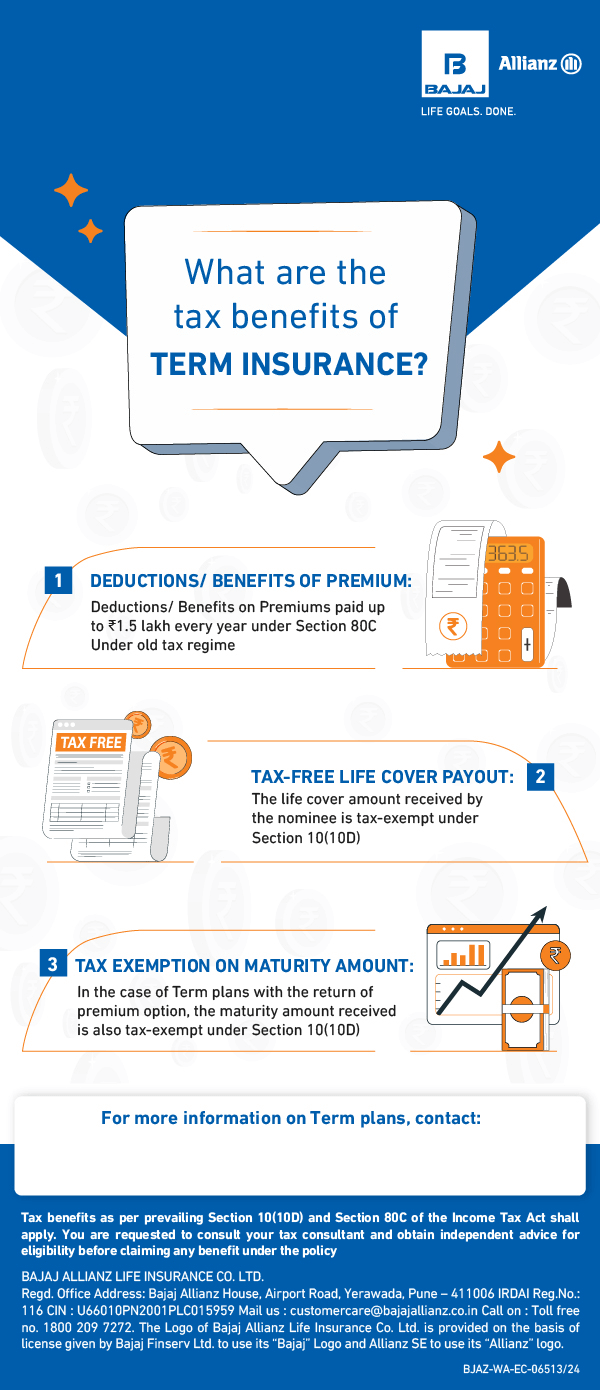~Tax benefits as per prevailing Income tax laws shall apply. Please check with your tax consultant for eligibility.
The above information is for general understanding and is meant to educate the general public at large. The reader will have to verify the facts, law and content with the prevailing tax statutes and seek appropriate professional advice before acting on the basis of the above information.
15% Discount applicable for customer's first individual life insurance policy on the life of the LA, applicable only on first year’s premium. 5% Discount for salaried employees, applicable only on first year’s premium. 6% Discount on online purchase is available for regular premium payment and limited premium payment frequency on first year's premium.
4Above illustration is for Bajaj Allianz Life eTouch II- A Non-Linked, Non-Participating, Individual Life Insurance Term Plan (UIN: 116N198V01) considering Male aged 23 years | Non-Smoker Preferred | Annual Income =>Rs. 15,00,000 per annum | Indian Resident | Policy Term (PT)– 30 years | Premium Payment Term (PPT) – 30 years | Sum Assured opted is Rs. 2,00,00,000 | Online Channel | Standard Life | 1st Year Premium is Rs. 7,159. 2nd Year onwards premium is Rs. 7,760. Total Premium is Rs. 2,32,199 | Medical Rates | Yearly Premium Payment Mode | Death benefit opted is lumpsum payout and monthly instalments (Lumpsum Payout Percentage : 40, Income Payout Percentage : 60). Income payout instalment opted for 40 years | Premium shown above is inclusive of Online Discount only, no other discounts have been considered and exclusive of Goods & Service Tax/ any other applicable tax levied, subject to changes in tax laws, and any extra premium and is for illustrative purpose only. For more details on risk factors, terms and conditions please read sales brochure & policy document (available on www.bajajallianzlife.com ) carefully before concluding a sale.
5Tax benefits as per prevailing Section 10(10D) and Section 80C of the Income Tax Act shall apply. You are requested to consult your tax consultant and obtain independent advice for eligibility before claiming any benefit under the policy. Above Tax benefit is calculated considering deduction of Rs. 150,000 and applicable tax rate of 31.20%.
2Get Free Health Management Services upto ₹ 31,000 per year
Health Management Services
| Frequency
| Cost (₹)
|
|---|
Doctor Insta-Consultations
| 3 consultations per month = 36 consultations per year
| Average cost per session = ₹ 500
Total cost per year = ₹ 500 * 36 = ₹ 18,000
|
Health Coach
(Diet & nutrition consultations)
| 1 consultation per month =
12 consultations per year
| Average cost per session = ₹ 500
Total cost per year = ₹ 500 * 12 = ₹ 6,000
|
Emotional Wellness
(Psychologists consultations)
| 1 consultation per month =
12 consultations per year
| Average cost per session = ₹ 500
Total cost per year = ₹ 500 * 12 = ₹ 6,000
|
Network discounts:
Medicines (M) - 10%
Lab-test booking (L) - 10%
| Throughout the year
| Assumption – Total
expense on these
services throughout
the year
| Total discounts that can be availed
throughout the year
|
M - ₹ 5,000
| ₹ 500
|
L - ₹ 5,000
| ₹ 500
|
Total per year as per assumption
| ₹ 31,000
|
Note: The above mentioned costs are based on estimated average market price for respective services. T&C apply.
Doctor Insta-Consultations and Health Coach Services are unlimited and the above numbers are assumed only for the purpose of calculation of the yearly benefit.
6Through Parental Care Option available in Bajaj Allianz Life Family Protect Rider (UIN:116B056V01)
*Tax benefits as per prevailing Section 10(10D) and Section 80C (under old tax regime) of the Income Tax Act shall apply. You are requested to consult your tax consultant and obtain independent advice for eligibility before claiming any benefit under the policy
Bajaj Allianz Life Insurance Company Limited, Bajaj Allianz Life eTouch II, Bajaj Allianz Life New Critical Illness Benefit Rider and Bajaj Allianz Life Family Protect Rider are the names of the company and the product/rider respectively and do not in any way indicate the quality of the product/rider and its future prospects or returns. For more details on risk factors, terms and conditions please read sales brochure & policy document of base product and rider carefully before concluding a sale or consult your “Insurance Consultant” for more details and eligibility conditions. Bajaj Allianz Life Superwoman Term comprises of Bajaj Allianz Life eTouch II – Life Shield variant (UIN:116N198V03) a Non-linked Non- Participating Individual Life Insurance Term Plan, Bajaj Allianz Life New Critical Illness Benefit Rider – Comprehensive option (UIN: 116B058V01) a Non-Linked, Non-Participating, Individual, Pure Risk Health Rider (this is a mandatory rider) and Bajaj Allianz Life Family Protect Rider – Child Care option (UIN: 116B056V01) - a Non-linked, Non-participating, Individual, Pure Risk Health Rider (this is an optional rider).
Bajaj Allianz Life eTouch II is also available individually for sale without the riders or with the other available riders options under the base policy.
^^*Available with Bajaj Allianz Life Family Protect Rider – Child Care option - A Lumpsum benefit equal to 105% of Total premiums paid4 w.r.t rider will be paid on the earliest occurrence of death or Accidental Total Permanent Disability, plus a monthly income as a percentage (0.1% to 0.5%) of Rider Sum Assured as opted at inception will be paid until child turns Age 25. 4Total Premiums Paid: Total Premiums paid till date w.r.t. the rider option shall be the total of all premiums received under the rider option chosen, exclusive of taxes, extra premium w.r.t. the rider, if any. This is an optional rider.
~~~Available with Bajaj Allianz Life New Critical Illness Benefit Rider - Comprehensive option (UIN: 116B058V01) - A Non-Linked, Non-Participating, Individual, Pure Risk Health Rider. This is a mandatory rider
^^^Health Management Services for Women upto ₹ 36,500 per year
Health Management Services for Women
| Frequency
| Cost (₹)
|
|---|
Comprehensive Health Check-Up:
- Cancer Screening
- Diabetic, Thyroid, Lipid profile tests
- Calcium Serum test
- Complete Blood Count test
| 1 per year
| ₹ 3,500
|
OPD*^* in-clinic consultations
(Specialist doctors like Gynaecologist, Obstetrician, Dermatologist, Paediatrician, Orthopaedic & General Physician)
*^*OPD – Outpatient Department
| 1 per year
| ₹ 1,000
|
Pregnancy OPD*^* wallet
(OPD*^* benefit worth ₹ 2,000 unlocked in case of pregnancy)
| Once during policy term
| Not considered in yearly cost since this is available once during policy term
|
Doctor Insta-Consultations
| 3 consultations per month = 36 consultations per year
| Average cost per session = ₹ 500
Total cost per year = ₹ 500 * 36 = ₹ 18,000
|
Health Coach
(Diet & nutrition consultations)
| 1 consultation per month =
12 consultations per year
| Average cost per session = ₹ 500
Total cost per year = ₹ 500 * 12 = ₹ 6,000
|
Emotional Wellness
(Psychologists consultations)
| 1 consultation per month =
12 consultations per year
| Average cost per session = ₹ 500
Total cost per year = ₹ 500 * 12 = ₹ 6,000
|
Network discounts:
Medicines (M) - 10%
Lab-test booking (L) - 10%
Out-patient consultation (O) - 10%
In-patient consultation (P) - 5%
| Throughout the year
| Assumption – Total
expense on these
services throughout
the year
| Total discounts that can be availed
throughout the year
|
M - ₹ 5,000
| ₹ 500
|
L - ₹ 5,000
| ₹ 500
|
O - ₹ 5,000
| ₹ 500
|
P - ₹ 10,000
| ₹ 500
|
Total per year as per assumption
| ₹ 36,500
|
Note: The above mentioned costs are based on estimated average market price for respective services. T&C apply.
Doctor insta consultations and health coach services are unlimited and the above numbers are assumed only for the purpose of calculation of the yearly benefit.
7Above illustration is for Bajaj Allianz Life iSecure - A Non-Linked Non-Participating Term Life Insurance Plan (UIN:116N109V05) considering Male aged 25 years | Non-Smoker | Policy Term (PT) – 10 years | Premium Payment Term (PPT) – 10 years | Sum Assured opted is ₹ 50,00,000 | Online Channel | Standard Life | Total Premium Paid is ₹ 1,17,340 | Medical Rates | Monthly Premium Payment Mode | Premium shown above is exclusive of Goods & Service Tax/any other applicable tax levied, subject to changes in tax laws, and any extra premium and is for illustrative purpose only.
8If the customer is digitally KYC compliant and meets the eligibility criteria, medical, and underwriting norms.
92% Discount on online purchase is available for regular premium payment and limited premium payment frequency throughout the premium payment term.
27Tax benefits as per prevailing Section 10(10D) and Section 80C (under old tax regime) of the Income Tax Act shall apply. You are requested to consult your tax consultant and obtain independent advice for eligibility before claiming any benefit under the policy.
21HSAR – High Sum Assured Rebate is subject to policy terms and conditions
22Premium rate applicable to female life will be based on the premium rate of 3 years’ younger male
35% Discount applicable for customer's first individual life insurance policy, applicable only on first year’s premium, 5% Discount for salaried customers, applicable only on first year’s premium, 6% Discount on online purchase is available for regular premium payment and limited premium payment frequency, applicable only on first year’s premium.
2Above illustration is for Bajaj Allianz Life Smart Protection Goal - A Non Linked, Non Participating, Individual Life Insurance Term Plan (UIN: 116N174V05) considering Male aged 25 years | Non-Smoker | Standard Life | Policy term (PT)– 30 years | Premium Payment Term (PPT) – 30 years | Total Sum Assured opted is Rs. 1,00,00,000 | Total Premium - Rs. 2,08,143 (1st Year Premium is Rs- 6535/- and 2nd Year onwards Rs -6952/- )| Online Channel | This is exclusive of discount for salaried customers and for customer's first individual life insurance policy | medical rates | Yearly Premium Payment Mode | Premium shown above is exclusive of Goods & Service Tax/any other applicable tax levied, subject to changes in tax laws, and any extra premium and is for illustrative purpose only.
1Product feature/benefit mentioned above are dependent on optional benefit, if selected.
~Tax benefits as per prevailing Section 10(10D) and Section 80C (under old tax regime) of the Income Tax Act shall apply. You are requested to consult your tax consultant and obtain independent advice for eligibility before claiming any benefit under the policy.



































 An ISO 9001:2015
An ISO 9001:2015 

